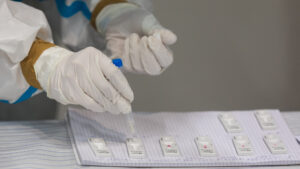Fall/winter season brings back COVID: what to know, how to protect yourself and others
- October 16, 2023
- By: Sally Crocker
- Community

With the return of fall comes cold and flu season, along with an uptick in COVID-19 cases across the U.S. With kids back in school and people moving indoors for more events and activities, opportunities for spreading viruses become a higher concern. Holidays are fast approaching as well, giving rise to travel plans and indoor family gatherings that can bring children and adults of all ages together in close spaces.
Experts note that COVID-19 circulates all year long, but picks up in the fall and winter, like influenza and other upper respiratory viruses. In addition to new vaccine formulations that have been approved for this fall’s COVID variants, there are a number of other ways to help reduce your risk and protect yourself and your family.

“Although the uptick so far is nowhere near the previous surges, we should still follow the usual COVID-19 measures,” said Dr. Rajesh Nandy, associate professor in the School of Public Health’s Department of Population and Community Health at The University of North Texas Health Science Center at Fort Worth.
“Stay home if you are sick or experiencing symptoms. Get tested and quarantine if positive. If you are a senior or have underlying health conditions that could be of concern, consider wearing an N95 or KN95 mask. They are the best masks and are still readily available.”
Communities have learned a lot since COVID-19 first made its appearance more than three years ago.
“Frequent handwashing, social distancing and following the coughing and sneezing etiquette we learned during the early days of COVID are still effective today,” said Jessica Maack Rangel, MS, RN, FNAP, HSC Executive Vice President of Health Systems. “If you are an older adult, are immune compromised or have young children, it’s important to check with your health provider about strategies that may work best for you.”
“The virus can be easily transmitted during close proximity in schools, daycare environments and communal living spaces like nursing homes and assisted living facilities,” Rangel said. “Close contact is considered by the CDC as being less than six feet apart from others for a total of 15 minutes or more over a 24-hour period.”
Vaccination is still considered the best prevention

The CDC continues advising that the best prevention for COVID-19 is an up-to-date vaccination.
Experts say it’s likely that people will need to get updated COVID immunizations annually, similar to the flu shot.
Since the virus that causes COVID-19 is always changing, vaccine protection declines over time. An updated vaccine can restore protection and help safeguard against the latest variants. COVID vaccines from Pfizer, Moderna and Novavax are all available now to the public.
As with flu shots, October is considered an optimal time to get the updated COVID vaccine, since peak protection usually occurs within the first three months when late fall and winter cases tend to be at their highest.
The CDC considers it safe to get the COVID shot and annual flu vaccine simultaneously.
Symptoms, testing and managing positive results

“The symptoms of COVID-19, the flu and RSV — all circulating right now — can be similar, so it’s important to consult your health provider about your symptoms to ensure appropriate strategies are recommended for your specific condition,” Rangel said.
Fever or chills, cough, shortness of breath, difficulty breathing, fatigue, muscle or body aches, headache, a new loss of taste or smell, sore throat, congestion or a runny nose, nausea, vomiting or diarrhea can all be symptoms.
The CDC recommends that if you have symptoms, test immediately. If you don’t have symptoms but have been exposed, wait a full five days after exposure to test.
“Tests kits do expire, so check the dates on those you might have at home,” said Dr. Tracey Barnett, SPH associate dean for academic affairs. “Notably, there have been extensions of some expiration dates as the test manufacturers provided data supporting a longer shelf life. Check the FDA website for information and a list of affected tests.”
“The government has also resumed offering four free tests to all households through the U.S. Postal Service now,” she added. “You can visit covid.gov/tests to order.”
If your family uses the four tests, consider picking up a few extra to have on hand prior to anyone showing symptoms. Your pharmacy can advise on cost, although most health insurance plans still cover both the COVID-19 vaccine and test kits at no charge.
“If you do test positive for COVID, please stay home, even if your symptoms are mild,” Barnett said. “This helps reduce community spread of the virus.”
Your location and risk factors could also be important to prevention efforts, she added. Masking on airplanes might be a good idea, she said, or in large, indoor, crowded spaces and when visiting potentially vulnerable relatives, including infants and elderly family members.
“Today, we have more tools than ever to prevent the worst outcomes from COVID-19,” Nandy noted.
“In general, be cautious and stay updated on the status of COVID-19 in your area,” he added. “Hospitalizations have tended to rise in previous fall and winter seasons, so it’s good to stay vigilant.”
Tarrant County Health Department and CDC advisements are excellent sources for staying updated.





Social media